Stuart Aken's Blog, page 296
August 2, 2011
Stuart's Daily Word Spot: Sobriquet
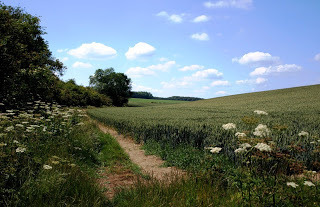 Sobriquet: noun – anepithet, nickname.
Sobriquet: noun – anepithet, nickname. Sobriquets are nicknames that most people know when they comeacross them; common examples are:
'The Big Apple' for New York City.'The Iron Lady' for the disastrous former British PrimeMinister, Margaret thatcher.'Auntie/Aunty' for the British Broadcasting Corporation or the Australian Broadcasting Corporation.'The Bard' for William Shakespeare, possibly the world'sgreatest playwright.'The Big Yin' for Billy Connolly,a very funny Scottish comedian.'The Boss' for BruceSpringsteen, a great US musician'The City' for the City of London, which is the central businessdistrict of London or for San Francisco, California'The Dark Continent' for the muchneglected and exploited continent of Africa'The Fab Four' for The Beatles,possibly the most famous pop band ever.'The Golden Bear' for Jack Nicklaus,the American golfing hero'The Great White North' for Canada; nosurprises here, especially for those who live there.'The Holy Land' for Israel / Palestine;possibly the least appropriate sobriquet, given the determination of itsinhabitants to continue an unholy fight that could have ended decades ago withthe application of tolerance and common sense.'Joltin' Joe' for Joe DiMaggio,USA Baseball playerand former husband of Marilyn Monroe'The King' for Elvis Presley,a very popular rock artist from the States.'The Land of the Long White Cloud'for New Zealand;a meteorological reference to possibly the world's most picturesque collectionof islands.'Madge' for Madonna; a singularly terse name for one ofpopular music's most enduring and creative artists'Old Nick' for Christianity's Devil; a mythical creationdeveloped to frighten the gullible by those who wish to have power over them.'Pommy', 'Pom' for an English person;Australian name,vaguely affectionate except when preceded by 'whingeing' or succeeded by 'bastard''The Red Planet' for Mars; a result of theplanet's appearance when viewed through a telescope'Satchmo'for Louis Armstrong; possibly the greatest jazzmusician to come out of the USA'The Smoke' for London; and nolonger appropriate, since the pollution has largely disappeared'The Sultan of Swat' for Babe Ruth,a Major league Baseball player from USA 'Tinseltown' forHollywood,California, USA, where triviality and superficiality reign supreme'Tricky Dicky' for Richard Nixon,37th President of the United States, after his involvement in the Watergatescandal'Westminster' for the British Parliament,because of the location of the Houses of Parliament.'Yankee' for an American of European ancestry unsympatheticto the South, originally only from those states that fought the Confederacy inthe Civil War but now from any non-Southern state. Used outside the USA for anyAmerican, along with 'Yank' and often derogatory.
2 August 1911 Einstein urged all scientists to refuse to domilitary work.
Pic: A track just outside North Dalton, East Riding of Yorkshire.
Published on August 02, 2011 07:00
August 1, 2011
New Source of Books from Emerging Writers
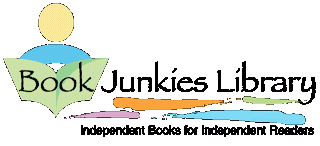 Developed from a Facebook group , a new website for readers to find new books from emerging writers has opened today at http://www.book-junkies-library.com/ . The Book Junkies Library is a brand new venture, featuring writers of all genres and pointing the their books. Visitors can quickly choose an author from those listed and the link takes them to a page describing their book(s) and giving links to those places where they can be bought. It serves as a jumping off point for readers looking for something different. Have a look and decide whether there's anything there for you.
Developed from a Facebook group , a new website for readers to find new books from emerging writers has opened today at http://www.book-junkies-library.com/ . The Book Junkies Library is a brand new venture, featuring writers of all genres and pointing the their books. Visitors can quickly choose an author from those listed and the link takes them to a page describing their book(s) and giving links to those places where they can be bought. It serves as a jumping off point for readers looking for something different. Have a look and decide whether there's anything there for you.For published writers, this is another opportunity to spread the word about your books.
Published on August 01, 2011 11:12
Stuart's Daily Word Spot: Fabulinus
 Fabulinus: this is another of my occasional gods from thevarious religions of the world; listed in the hope that those who don't knowmight become acquainted with both the variety and the history of religiousmyth.
Fabulinus: this is another of my occasional gods from thevarious religions of the world; listed in the hope that those who don't knowmight become acquainted with both the variety and the history of religiousmyth. Fabulinus, as you've no doubt guessed, was a Roman god. Hewas considered responsible for the first words of a child and offerings weremade to him on the occasion that a child first spoke. Although a figure fromthe popular religion of ancient Rome, he failed to appear in literary Romanmythology, but was one of the 'little gods', dear to the Roman home. Thesesmall gods were placed on the sacred list of the Indigitamenta, and invoked tohelp on special occasions.
Pic: Barley mixed with wheat.
Published on August 01, 2011 07:00
July 31, 2011
Stuart's Daily Word Spot: Historic or historical?
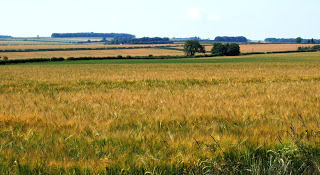 Historic: adjective- famous or important in history; having great and lasting importance; known orestablished in the past; dating from or preserved from a past time or culture.
Historic: adjective- famous or important in history; having great and lasting importance; known orestablished in the past; dating from or preserved from a past time or culture.Historical: adjective- of, relating to, or having the character of history; based on history; usedin the past and reproduced in historical presentations; famous in history.
As can be seen, there is a slight element ofinterchangeability here. However, the primary use of each of these alternativesis as follows:
If it's historic, it's something of note that happened inthe past.If it's historical, it's something based on the past.
So:
'The Battle of Trafalgar, culminating in the defeat of theFrench and the untimely death of Admiral Lord Nelson, was an historic event inthe Europe of the early 19th century.'
'Jean Plaidy is a well-known writer of historical novels.'
Pic: A field of ripening barley.
Published on July 31, 2011 07:00
July 30, 2011
Stuart's Daily Word Spot: Roman a clef
 Roman a clef: This is French for 'a novel with a key', anddescribes a novel about real life, overlain with a façade of fiction. Fictitiousnames actually represent real people, and the 'key' works through therelationship between the reality and the fiction. This 'key' may be producedseparately by the author, or deduced through the use of literary devices like epigraphs.
Roman a clef: This is French for 'a novel with a key', anddescribes a novel about real life, overlain with a façade of fiction. Fictitiousnames actually represent real people, and the 'key' works through therelationship between the reality and the fiction. This 'key' may be producedseparately by the author, or deduced through the use of literary devices like epigraphs.Examples of Roman a clef novels are:
Glenarvon (1816) by Lady Caroline Lamb: chronicles her affair with Lord Byron,who is thinly disguised as the title character.The Carpetbaggers (1961) by Harold Robbins: fictionalizedversion of Hollywood exploits of Howard Hughes and actress Jean Harlow.The Ghost (2007) by Robert Harris: the character of AdamLang is loosely based on former Prime Minister Tony Blair. The Ghost Writer isa movie by Director Roman Polanski who turned the book into a film with PierceBrosnan playing the character.
Pic: Farm drive above North Dalton, East Yorkshire.
Published on July 30, 2011 07:00
A Game of Thrones, by George R.R. Martin, Reviewed.
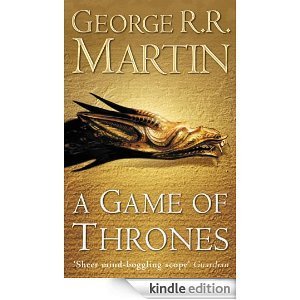 A Game of Thrones, fantasy in thestyle of swords and dragons, transcends the genre on a number of levels. Imaginativeuse of the conventions allows aficionados to appreciate the set pieces, whilstgiving rein to a wider range of events than is commonly the case in such works.The cast of characters is extensive and the names link well with the feel ofthe novel: that feel is mediaeval, without being specific to any country'shistory. This is a tale of knights, jousting,battles, tourneys, sword play and courtly honour in all its variety. But themany 'Houses' of power and influence that drive the various story themes ofintrigue, plotting, ambition and duty, are each representative of the majorcharacteristic of their 'heads'. So, the Starks are as much driven by duty asthe Lannisters are impelled by ambition.Behind and beneath the layers ofstory that pit knight against knight, King against usurper, is a greater andvery much older power. As petulant youth defies wise maje, the power gameproceeds, teaching lessons to those with the humility to learn.This book is the first in a seriesand cleverly ends by bringing several climaxes together, whilst introducing anelement that lets the reader know there is much more to come. The denouement,whilst inevitable, comes at a pace that takes away the breath. I look forwardto the sequels.I read this novel on holiday inCrete, on my Kindle. The one missing element that would have made the read moreinteresting and rendered the plot easier to follow, was a map of the fantasyworld. I can only hope that Amazon get their act together and make thepublishing and viewing of such maps easy in the near future.
A Game of Thrones, fantasy in thestyle of swords and dragons, transcends the genre on a number of levels. Imaginativeuse of the conventions allows aficionados to appreciate the set pieces, whilstgiving rein to a wider range of events than is commonly the case in such works.The cast of characters is extensive and the names link well with the feel ofthe novel: that feel is mediaeval, without being specific to any country'shistory. This is a tale of knights, jousting,battles, tourneys, sword play and courtly honour in all its variety. But themany 'Houses' of power and influence that drive the various story themes ofintrigue, plotting, ambition and duty, are each representative of the majorcharacteristic of their 'heads'. So, the Starks are as much driven by duty asthe Lannisters are impelled by ambition.Behind and beneath the layers ofstory that pit knight against knight, King against usurper, is a greater andvery much older power. As petulant youth defies wise maje, the power gameproceeds, teaching lessons to those with the humility to learn.This book is the first in a seriesand cleverly ends by bringing several climaxes together, whilst introducing anelement that lets the reader know there is much more to come. The denouement,whilst inevitable, comes at a pace that takes away the breath. I look forwardto the sequels.I read this novel on holiday inCrete, on my Kindle. The one missing element that would have made the read moreinteresting and rendered the plot easier to follow, was a map of the fantasyworld. I can only hope that Amazon get their act together and make thepublishing and viewing of such maps easy in the near future.
Published on July 30, 2011 00:40
July 29, 2011
Stuart's Daily Word Spot: Early
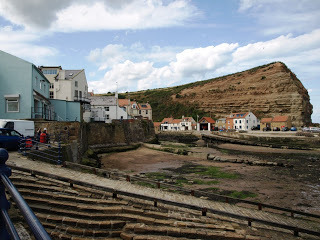 Early: adjective -designating, belonging to, existing or occurring close to the beginning of a timeperiod, e.g. morning, day, evening, etc.; belonging to, designating, orrelating to the initial phase of an epoch, personal development, history of apeople, or the world etc.; ancient; at the beginning in serial order; happeningbefore it is too late; arriving or occurring before the due time; former,foremost, first in time.
Early: adjective -designating, belonging to, existing or occurring close to the beginning of a timeperiod, e.g. morning, day, evening, etc.; belonging to, designating, orrelating to the initial phase of an epoch, personal development, history of apeople, or the world etc.; ancient; at the beginning in serial order; happeningbefore it is too late; arriving or occurring before the due time; former,foremost, first in time.'Unable to sleep, Gloria spent the early hours watching thesun rise blood red from a field of pinks, oranges, flame and gold.'
'Harold was so nervous about being late for his interviewthat he turned up an hour early and had to kill time in a local café, drinkingcopious amounts of coffee.'
Pic: Staithes, North Yorkshire.
Published on July 29, 2011 08:00
July 28, 2011
Stuart's Daily Word Spot: Purple Prose
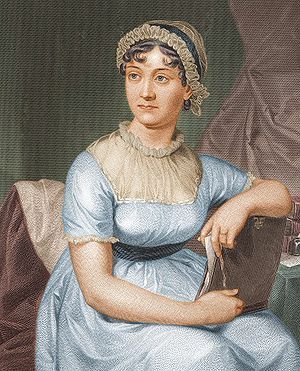 Image via Wikipedia
Image via WikipediaPurple prose: the use of over flowery or emotionallyexaggerated language to describe events, people and feelings in a work of fiction.There are those, the ones without any romantic content to the souls, whoautomatically conclude that any work of romance is necessarily composed ofpurple prose. Such ignorance has long been demonstrated as erroneous by thebrilliance of writers like Jane Austen, Rosie Thomas and D.H Lawrence.
A passage of purple prose, especially for you:'Jason, tanned and taught muscles staining at the fine silkof his designer shirt, poured honeyed words of love and appreciation overLaticia's panting form as he stroked her pulsating flesh with the tender tipsof his exploring fingers. Heavenly choirs chorused enchanting melodies in tonesof ecstasy as his roseate lips lingered on hers, raising her desire to levelsnever before experienced. And the heat of a thousand flaming brands of passionseared through her heaving loins as his strong but gentle hands slipped beneaththe…'
That's enough of that. It's difficult to write this stuffunless it comes to you naturally. But you get the picture?

Published on July 28, 2011 07:00
July 27, 2011
Author Interview with Lynda Hilburn
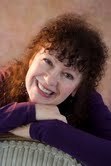 Tell us about the first book in your Kismet Knight, VampirePsychologist series, THE VAMPIRE SHRINK.
Tell us about the first book in your Kismet Knight, VampirePsychologist series, THE VAMPIRE SHRINK.Here's a brief blurb:
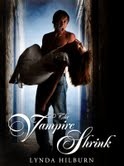 Kismet Knight is a young psychologist with a growing clinicalpractice, and she's always looking for something to give her the edge in herchosen career. When her new client turns out to be a Goth teenager whodesperately wants to become a vampire, Kismet is inspired to become the vampireshrink, offering her services to people who believe they are undead. Kismetherself, as a scientist, knows it's hokum, but she's looking at it in a purelypsychoanalytic light, already imagining the papers she's going to write on thisstrange subculture. That's until she meets the leader of a vampire coven, asexy, mysterious man who claims to be a powerful 800-year-old vampire, and sheis pulled into a whirlwind of inexplicable events that start her questioningeverything she once believed about the paranormal.
Kismet Knight is a young psychologist with a growing clinicalpractice, and she's always looking for something to give her the edge in herchosen career. When her new client turns out to be a Goth teenager whodesperately wants to become a vampire, Kismet is inspired to become the vampireshrink, offering her services to people who believe they are undead. Kismetherself, as a scientist, knows it's hokum, but she's looking at it in a purelypsychoanalytic light, already imagining the papers she's going to write on thisstrange subculture. That's until she meets the leader of a vampire coven, asexy, mysterious man who claims to be a powerful 800-year-old vampire, and sheis pulled into a whirlwind of inexplicable events that start her questioningeverything she once believed about the paranormal.How longhave you been writing?
I've beenwriting nonfiction for 30 years: newspaper and magazine articles, newspapercolumns, research materials, training materials, journals, etc. Of course, someof my journal entries fell into the category of wishful thinking, whichprovided great preparation for what was to come. It wasn't until 2002 that Iseriously began exploring fiction.
How didyou pick the genre you write in?
My genre isgenerally paranormal, which includes urban fantasy, paranormal mystery,paranormal romance, erotic paranormal, dark paranormal, psychologicalparanormal, paranormal thriller, paranormal humor/satire, even paranormal withhorror elements! My love of all things dark and spooky made it impossible forme to write anything else. And, no matter how hard I try, I can't help but addextra elements. I'm always fascinated by the underlying layers of things (can'ttake the psychotherapist out of the writer).
Do youplot or do you write by the seat of your pants?
Sometimes Ireally wish I could plot. Plotting seems so organized. So efficient. Plottersseem to get so much more done. But, I'm a pantser. I never know what's comingin the story until I see it on the screen in front of me. I buy books aboutplotting and they gather dust. I am toying with the notion of being a "pantserwith plotting tendencies." We'll see how that goes! As long as I give myselfroom to completely change everything anytime I wish, I think that should work.
What drewyou to the subject of The Vampire Shrink?
The book isabout a Denver psychologist who gets pulled into a vampire underworld, andwinds up working with an unusual clientele. I've always been a vampire fan.There's just something about the various dark archetypes for these compellingand frightening creatures. The actual idea for the book came from a clientsession. I'd listened to a young woman talk about a non-human group she wantedto become part of and I began to notice that her words reminded me of some ofthe popular vampire books I'd read. She described this group (not vampires, butI do have other clients who live the Goth/vampire-wannabe lifestyle, includingdrinking blood) as if they were bloodsuckers. After the session, as I satwriting up case notes, I daydreamed about what might happen if I walked out tomy waiting room and found a gorgeous vampire sitting there. I went home thatnight and started writing. It was the most fun I've ever had writing.Tell us about yourpsychologist heroine Kismet Knight. Since you both share the same profession,do you think of her as your alter ego? I'm nodding. Kismet isdefinitely an idealized version of me: she's thinner, younger, prettier and hasa much more exciting love life than I do! I'm probably in the minority here,but I believe all characters reflect some aspect of the author's psyche. Eitherour characters represent aspects we like in ourselves, or perhaps elementswe're unconscious of. Or they're parts of ourselves we're afraid we are, orwish we were, or general archetypes available to (and parts of) everyone. Ialways smile when an author tells me her characters are separate from her.
What doyou know now that you are published that you wish you'd known sooner?
The biggestlessons I've learned have been about the business side of being an author. Ihad been used to working for myself for most of my adult life. That meant I wascomfortable charting my own course and calling the shots. Well, traditionalpublishing has its own rules and most authors (all?) have little chance ofcalling any shots. Especially in the beginning. I made lots of mistakes, mostlybecause I just didn't know any better. I kept assuming the people I worked withhad my best interests at heart and they would give me good advice. It took awhile before I understood the challenging nature of the publishing world. I hadheard all the talk from author friends about the need to grow a tough skin andmaking sure I had lots of outside support. But until I held my nose and jumpedinto the deep end of the pool, I had no idea what they meant. So, I experienceda steep and frustrating learning curve. I know much more about all aspects nowthan I did then. It's true. A writer has to cultivate both her creative sideand her business instincts. Both are equally important.How long did it take you towrite each of your two books, starting from when the idea came intoyour thoughts? From the moment I sat downto write, it took 14 months to complete The Vampire Shrink. It probablywouldn't have taken so long if I hadn't thrown my chapters away every time aparticular crit partner said I was "doing it wrong." Turns out these dearfriends (all romance writers) were trying to help me learn to write romancecorrectly, and that wasn't my focus. Once I figured out I was crossing genres,things moved much faster. I trusted my intuition more. I had an actual deadlinefor the second book, formerly called Dark Harvest, so that one took me about ayear, and it was much more difficult to write! My new publisher (Jo FletcherBooks/Quercus Books) asked me to write a new book #2 (the former book #2 willnow be a later book). I have just a few months to come up with an entire book.Yikes. I've got my fingers crossed I'm up to the challenge!
Describe your workspace.
I live in a small townhouse (smaller than my heroine's) and my office is inthe loft area. My computer sits on a huge table, surrounded by files, books,magazines, office equipment and various papers. There are vampire posters onthe walls around me. I keep the TV on in the background for noise. I can't playmusic while I write because I'm a singer and music distracts me.
Best and worst part of being a writer?
Best part is typing the words, "the end." LOL. Worst is forcing myself tosit in the chair long enough to get the words out.
Advice for other writers?
It really is true that you should never give up. Read stories about otherwriters and how many dark times they had to overcome before achieving whateverthey consider success. Just when you think it's all over, it begins again. Bepersistent, tenacious and stubborn. Keep writing. Keep laughing. Of course, nowwith all the indie publishing, it's a brave new world!
What are you writing now?
I'm working on a new second book (tentatively called Blood Therapy) in myKismet Knight, Vampire Psychologist series (and I have ideas for the book afterthat, which might push the previous book #2 back to being book #4). I also havelots of other ideas I'd like to write about. It would be great to win thelottery and be able to write full time!
How can people buy your books?
The UK version of The Vampire Shrink will be out in hardcover and tradepaperback – and hopefully ebook – September, 2011. The books can be pre-orderedat Amazon.com. The North American version should arrive early 2012. My booksshould be available everywhere.
How can readers learn more about you and your books?
Website: http://www.lyndahilburnauthor.com
Blog: http://www.paranormalityuniverse.blogspot.com
Facebook: http://www.facebook.com/lyndahilburn
Twitter: http://www.twitter.com/lyndahilburn
Published on July 27, 2011 08:30
Stuart's Daily Word Spot: Leach or leech?
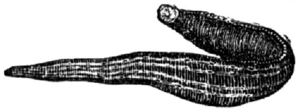 Image via Wikipedia
Image via WikipediaLeach or leech? Leach: verb – to dissolve by percolation;subject soil, etc, to the action of percolating water, which takes out solubleconstituents; slowly deprive.Leech: verb – to apply leeches to a patient inthe cause of medical treatment; to drain of energy, resources; attach oneselflike a leech, be parasitic.A leech (noun) is a parasitic worm that sucksblood from its host.
'Thecontinuous rains had leached the soil of all goodness, so that it would no longersupport a crop of any worth.'
'Doctor Deathdecided that the only cure for his patient's hysteria was to leech her on adaily basis, slowly draining her of what he considered was her bad blood.'

Published on July 27, 2011 07:00



